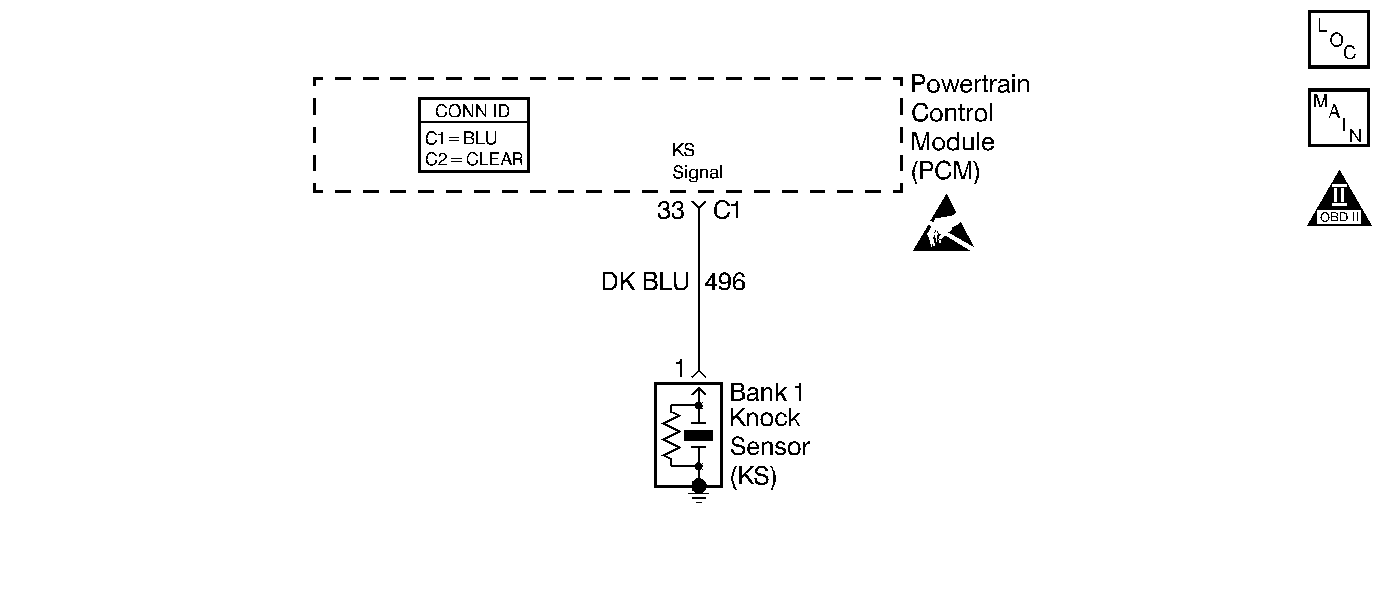
Circuit Description
The PCM contains integrated Knock Sensor (KS) diagnostic circuitry. An input signal from the knock sensor is used to detect engine detonation, allowing the PCM to retard Ignition Control (IC) spark timing based on the amplitude and frequency of the KS signal being received. The knock sensors produce an AC signal under all engine operating conditions. During engine operation, the PCM calculates the average voltage of the knock sensor signal. If the PCM malfunctions in a manner which will not allow proper diagnosis of the KS circuit, DTC P0325 will set.
Conditions for Running the DTC
| • | No TP, MAF, ECT, CKP, CMP sensor, VSS, DTCs are set. |
| • | Engine speed is between 1000 and 5000 RPM. |
| • | The engine has been running for a minimum of 30 seconds. |
| • | Throttle angle is greater than 15%. |
| • | Engine load is greater than 45%. |
| • | Engine coolant temperature is greater than 60°C (140°F). |
| • | Maximum spark retard is less than 15 degrees. |
| • | System voltage is greater than 9 volts. |
Conditions for Setting the DTC
| • | The PCM detects a malfunction in the integrated knock sensor diagnostic circuitry which will not allow proper diagnosis of the knock sensor circuits. |
| • | Above conditions for at least 30 seconds. |
Action Taken When the DTC Sets
| • | The PCM will illuminate the malfunction indicator lamp (MIL) during the second consecutive trip in which the diagnostic test has been run and failed. |
| • | The PCM will store conditions which were present when the DTC set as Freeze Frame and Failure Records data. |
Conditions for Clearing the MIL/DTC
| • | The PCM will turn OFF the MIL during the third consecutive trip in which the diagnostic has been run and passed. |
| • | The History DTC will clear after 40 consecutive warm-up cycles have occurred without a malfunction. |
| • | The DTC can be cleared by using the scan tool. |
Diagnostic Aids
Check for the following conditions:
| • | Poor connection at PCM. Inspect knock sensor and PCM connectors for backed out terminals, broken locks, and improperly formed or damaged terminals. Refer to Intermittents and Poor Connections Diagnosis Repairing Connector Terminals and Connector Repairs . |
| • | Misrouted harness. Inspect the knock sensor harness to ensure that it is not routed too close to high voltage wires such as spark plug leads. |
Reviewing the Fail Records vehicle mileage since the diagnostic test last failed may help determine how often the condition that caused the DTC to be set occurs. This may assist in diagnosing the condition.
Test Description
Number(s) below refer to the step number(s) on the Diagnostic Table:
-
Ensures that the malfunction is present.
-
If sent here from symptoms, proceed with the diagnostic table.
-
This vehicle is equipped with a PCM which utilizes an Electrically Erasable Programmable Read Only Memory (EEPROM). When the PCM is being replaced, the new PCM must be programmed.
Step | Action | Value(s) | Yes | No |
|---|---|---|---|---|
1 | Was the Powertrain OBD System Check performed? | -- | ||
|
Important: : If a mechanical engine knock can be heard repair the engine mechanical problem before proceeding with this diagnostic. Refer to Base Engine Misfire Diagnosis .
Note test result, does scan tool indicate DTC P0325 failed this ignition? | -- | |||
Does scan tool indicate DTC P0325 test failed this ignition? | -- | Go to Diagnostic Aids | ||
|
Important: : The replacement PCM must be programmed. Go to Powertrain Control Module Replacement/Programming . Replace the PCM. Is the action complete? | -- | -- | ||
5 |
Does the scan tool indicate DTC P0325 test failed this ignition? | -- | System OK |
